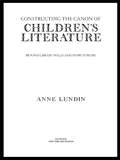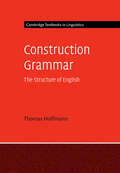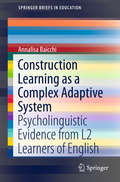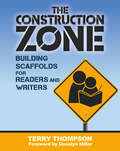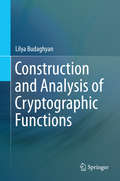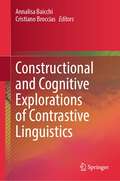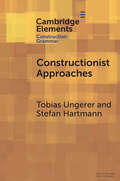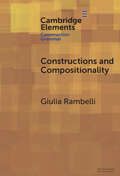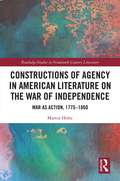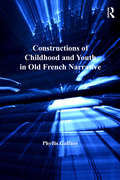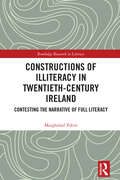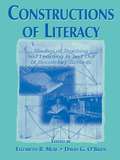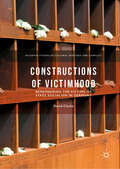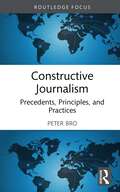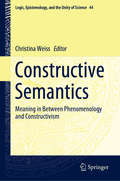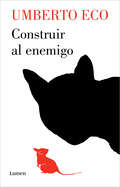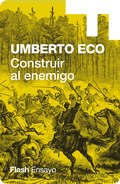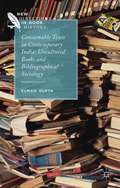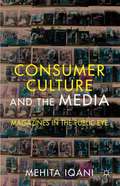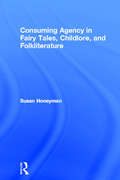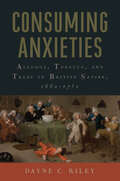- Table View
- List View
Constructing the Canon of Children's Literature: Beyond Library Walls and Ivory Towers (Children's Literature and Culture #Vol. 31)
by Anne LundinIn this pioneering historical study, Anne Lundin argues that schools, libraries, professional organizations, and the media together create and influence the constantly changing canon of children's literature. Lundin examines the circumstances out of which the canon emerges, and its effect on the production of children's literature. The volume includes a comprehensive list of canonical titles for reference.
Constructing the Canon of Early Modern Drama
by Jeremy LopezFor one hundred years the drama of Shakespeare's contemporaries has been consistently represented in anthologies, edited texts, and the critical tradition by a familiar group of about two dozen plays running from Kyd's Spanish Tragedy to Ford's 'Tis Pity She's a Whore by way of Dekker, Jonson, Middleton and Webster. How was this canon created, and what ideological and institutional functions does it serve? What preceded it, and is it possible for it to become something else? Jeremy Lopez takes up these questions by tracing a history of anthologies of 'non-Shakespearean' drama from Robert Dodsley's Select Collection of Old Plays (1744) through those recently published by Blackwell, Norton, and Routledge. Containing dozens of short, provocative readings of unfamiliar plays, this book will benefit those who seek a broader sense of the period's dazzling array of forms.
Constructing the Little House: Gender, Culture, and Laura Ingalls Wilder
by Ann RominesWith more than thirty-five million copies in print, the Little House series, written in the 1930s and 1940s by Laura Ingalls Wilder and her daughter, Rose Wilder Lane has been a spectacular commercial success. This work examines what elements of the eight books account for the series' enduring power and what the novels tell us about 19th-century culture.
Construction Grammar (Cambridge Textbooks in Linguistics)
by Thomas HoffmannWhat do speakers of a language have to know, and what can they 'figure out' on the basis of that knowledge, in order for them to use their language successfully? This is the question at the heart of Construction Grammar, an approach to the study of language that views all dimensions of language as equal contributors to shaping linguistic expressions. The trademark characteristic of Construction Grammar is the insight that language is a repertoire of more or less complex patterns – constructions – that integrate form and meaning. This textbook shows how a Construction Grammar approach can be used to analyse the English language, offering explanations for language acquisition, variation and change. It covers all levels of syntactic description, from word-formation and inflectional morphology to phrasal and clausal phenomena and information-structure constructions. Each chapter includes exercises and further readings, making it an accessible introduction for undergraduate students of linguistics and English language.
Construction Learning as a Complex Adaptive System: Psycholinguistic Evidence from L2 Learners of English (SpringerBriefs in Education)
by Annalisa BaicchiThis book presents the current state of the art on Construction Grammar models and usage-based language learning research. It reports on three psycholinguistic experiments conducted with the participation of university-level Italian learners of English, whose second language proficiency corresponds to levels B1 and B2 of the 'Common European Framework of Reference for Languages' (CEFR). This empirical research on the role of constructions in the facilitation of language learning contributes to assessing how bilinguals deal with L2 constructions in the light of sentence-sorting, sentence-elicitation, and sentence-completion tasks. Divided into two parts, the book first introduces the main theoretical prerequisites and then reports on the experimental studies. It provides a comprehensive review of the current research in a range of disciplines, including complexity theories, cognitive semantics, construction grammars, usage-based linguistics, and language learning.
Construction Zone: Building Scaffolds for Readers and Writers
by Terry ThompsonInstructional scaffolding is an essential part of teaching literacy. But what is scaffolding exactly? What does it look like in a classroom, and how can we improve the ways we use it? Despite its prominence in the repertoire of teaching strategies, scaffolding remains a vague concept for many teachers. ' In essence, scaffolding is the idea of supporting students as they build independence. In The Construction Zone: Building Scaffolding for Readers and Writers, Terry Thompson identifies four critical processes to deepen your understanding and improve your practice of instructional scaffolding: ·' ' ' ' ' ' ' ' Finding and maintaining a specific focus ·' ' ' ' ' ' ' ' Practicing flexibility in planning and delivering instruction ·' ' ' ' ' ' ' ' Giving constructive feedback in response to student efforts ·' ' ' ' ' ' ' ' Monitoring to ensure that students are working at optimal levels of responsibility Thompson' encourages teachers to enhance their use of the traditional gradual release process through five actionable steps: show, share, support, sustain, and survey, and in doing so provides procedures and techniques to help them establish and maintain strong scaffolds throughout the instructional day. The Construction Zone is written from the teacher's perspective and urges educators to fully embrace their role in the scaffolding process while staying mindful of the effect it has on students. ' Taking a student from dependence upon the teacher to independent learning is what teaching is all about, and instructional scaffolding is key to accomplishing this goal. Regardless of where you are in your understanding of instructional scaffolding, The Construction Zone will raise your level of awareness around your instructional practices and the ways you scaffold students to independence.' '
Construction and Analysis of Cryptographic Functions
by Lilya BudaghyanThis book covers novel research on construction and analysis of optimal cryptographic functions such as almost perfect nonlinear (APN), almost bent (AB), planar and bent functions. These functions have optimal resistance to linear and/or differential attacks, which are the two most powerful attacks on symmetric cryptosystems. Besides cryptographic applications, these functions are significant in many branches of mathematics and information theory including coding theory, combinatorics, commutative algebra, finite geometry, sequence design and quantum information theory. The author analyzes equivalence relations for these functions and develops several new methods for construction of their infinite families. In addition, the book offers solutions to two longstanding open problems, including the problem on characterization of APN and AB functions via Boolean, and the problem on the relation between two classes of bent functions.
Constructional Change in English: Developments in Allomorphy, Word Formation, and Syntax
by Martin HilpertMartin Hilpert combines construction grammar and advanced corpus-based methodology into a new way of studying language change. Constructions are generalizations over remembered exemplars of language use. These exemplars are stored with all their formal and functional properties, yielding constructional generalizations that contain many parameters of variation. Over time, as patterns of language use are changing, the generalizations are changing with them. This book illustrates the workings of constructional change with three corpus-based studies that reveal patterns of change at several levels of linguistic structure, ranging from allomorphy to word formation and to syntax. Taken together, the results strongly motivate the use of construction grammar in research on diachronic language change. This new perspective has wide-ranging consequences for the way historical linguists think about language change. It will be of particular interest to linguists working on morpho-syntax, sociolinguistics and corpus linguistics.
Constructional and Cognitive Explorations of Contrastive Linguistics
by Annalisa Baicchi Cristiano BrocciasThis book approaches the field of contrastive linguistics from a comparative and robust perspective that combines the tenets of construction grammar and cognitive linguistics. In doing so, it shows how their integration can help to successfully enhance research on contrastivity, by means of updated theoretical frameworks and applied methodologies that combine language and thought. It compares ten different languages and offers analyses of constructions at all levels of the linguistic organization, identifying the cognitive motivations that instantiate the linguistic data retrieved from corpora. Relevant to both cognitive and non-cognitive linguists interested in variation and contrastive approaches, as well as graduate students in these areas, this book makes a significant contribution to existing work on the various types of constructional and discourse-based phenomena in modern languages.
Constructionist Approaches: Past, Present, Future (Elements in Construction Grammar)
by Stefan Hartmann Tobias UngererConstruction Grammar (CxG) has developed into a broad and highly diverse family of approaches that have in common that they see constructions, i.e. form-meaning pairs at various levels of abstraction and complexity, as the basic units of language. This Element gives an overview of the origin and the current state of the art of constructionist approaches, focusing, on the one hand, on basic concepts like the notion of 'constructions', while at the same time offering an in-depth discussion of current research trends and open questions. It discusses the commonalities and differences between the major constructionist approaches, the organization of constructional networks as well as ongoing research on linguistic creativity, multimodality and individual differences. This title is also available as Open Access on Cambridge Core.
Constructions and Compositionality: Cognitive and Computational Explorations (Elements in Construction Grammar)
by Giulia RambelliHow do we understand any sentence, from the most ordinary to the most creative? The traditional assumption is that we rely on formal rules combining words (compositionality). However, psycho- and neuro-linguistic studies point to a linguistic representation model that aligns with the assumptions of Construction Grammar: there is no sharp boundary between stored sequences and productive patterns. Evidence suggests that interpretation alternates compositional (incremental) and noncompositional (global) strategies. Accordingly, systematic processes of language productivity are explainable by analogical inferences rather than compositional operations: novel expressions are understood 'on the fly' by analogy with familiar ones. This Element discusses compositionality, alternative mechanisms in language processing, and explains why Construction Grammar is the most suitable approach for formalizing language comprehension.
Constructions of Agency in American Literature on the War of Independence: War as Action, 1775-1860 (Routledge Studies in Nineteenth Century Literature)
by Martin HoltzThis book argues that the negotiation of agency is central not only to the experience of war but also to its representation in cultural expressions, ranging from a notion of disablement, expressed in victimization, immobilization, traumatization, and death, to enablement, expressed in the perpetration of heroic, courageous, skillful, and powerful actions of assertion and dominance. In order to illustrate this thesis, it provides a comprehensive analysis of literary representations of the American War of Independence from 1775, the beginning of the war, up until roughly 1860, when the Civil War marked a decisive historical turning point. As the first national war, it has an unquestionably exemplary status for the development of American conceptions of war. The in-depth study of exemplary texts from a variety of genres and by authors like Thomas Paine, Benjamin Franklin, James Fenimore Cooper, Catharine Sedgwick, William Gilmore Simms, and Herman Melville, demonstrates that the overall character of Revolutionary War literature presents the war as a forum in which collective and individual agency is expressed, defended, and cultivated. It uses the military environment in order to teach the values of discipline and self-subordination to a communal good, which are perceived as basic principles of a Republican virtue to guide the actions of the autonomous individual in a popular democracy.
Constructions of Childhood and Youth in Old French Narrative
by Phyllis GaffneyWhat do we know of medieval childhood? Were boundaries always clear between childhood and young adulthood? Was medieval childhood gendered? Scholars have been debating such questions over half a century. Can evidence from imaginative literature test the conclusions of historians? Phyllis Gaffney's innovative book reveals contrast and change in the portrayal of childhood and youth by looking at vernacular French narratives composed between 1100 and 1220. Covering over sixty poems from two major genres - epic and romance - she traces a significant evolution. While early epics contain only a few stereotypical images of the child, later verse narratives display a range of arguably timeless motifs, as well as a growing awareness of the special characteristics of youth. Whereas juvenile epic heroes contribute to the adult agenda by displaying precocious strength and wisdom, romance children are on the receiving end, requiring guidance and education. Gaffney also profiles the intriguing phenomenon of enfances poems, singing the youthful deeds of established heroes: these 'prequels' combine epic and romance features in distinctive ways. Approaching the history of childhood and youth through the lens of literary genre, this study shows how imaginative texts can both shape and reflect the historical development and cultural construction of emotional values.
Constructions of Illiteracy in Twentieth-Century Ireland: Contesting the Narrative of Full Literacy (Routledge Research in Literacy)
by Maighréad TobinConstructions of Illiteracy in Twentieth Century Ireland: Contesting the Narrative of Full Literacy offers new insights into literacy and illiteracy in the context of twentieth-century Ireland. Through a close analysis of archived documentation from educational, military, and parliamentary sources, the book reveals a potent narrative of full literacy that promoted literacy proficiency as a facet of the Irish national identity and suppressed any formal acknowledgment of illiteracy within the adult population. Tobin applies a sociological approach and uses Foucauldian concepts of knowledge, power, discourse, and silence to examine how constructions of illiteracy and the “illiterate person” varied over time, while being consistently bound to nationalism and nation-building in the twentieth century. Though focused on Irish society from 1900-1980, this volume also offers a resonant lens through which to examine the aims of the “Decade of Centenaries,” an Irish Government initiative spanning 2012-2023 that commemorates significant events in the history of the Irish state. Relevant to any readers with an interest in the Irish experience of independence, decolonisation, and postcolonialism, this book will be a useful companion for scholars and postgraduate students of literacy and Irish studies more broadly.
Constructions of Literacy: Studies of Teaching and Learning in and Out of Secondary Classrooms
by Elizabeth B. Moje David G. O’BrienConstructions of Literacy explores and represents, through a series of cases and commentaries, how and why secondary school teachers and students use literacy in formal and informal learning settings. As used in the context of this book, secondary literacy refers to speaking, listening, reading, writing, and performing. It also refers to how these processes or events are constructed, negotiated, and used for specific purposes by teachers and students as they engage in various classroom, school, and community practices and interactions. The authors operate from a stance that literacy is socially, culturally, and historically constructed. They recognize that there are many different perspectives on how that construction occurs--some arguing for institutional and structural influences--others suggesting that people have some degree of agency within the constraints imposed by larger structures. A distinguishing feature of the volume is that the contributors explore and make explicit differing perspectives on literacy as a social construction. The volume is built around case studies of secondary school teachers' and students' literacy practices inside and outside of schools. The cases include diverse (critical, cultural, feminist, interpretive, phenomenological, and postmodern) theoretical and epistemological perspectives and research methodologies, making this one of the first collections of studies in secondary content area classrooms conducted from multiple perspectives. It concludes with two Commentaries, one by Donna Alvermann and one by David Bloome, in which they discuss and critique the contributions made from the different perspectives and grapple with how they simultaneously illuminate and confuse issues in literacy theory, research, and practice. Preservice and in-service teachers, school professionals, and researchers in literacy education, secondary education, and curriculum theory will find this book stimulating and informative. It will help them analyze the complexities of secondary literacy teaching and learning, and examine their own understandings of literacy within their own literacy contexts.
Constructions of Masculinity in British Literature from the Middle Ages to the Present
by Stefan HorlacherAn in-depth analysis into the construction of male identity as well as a unique and comprehensive historical overview of how masculinity has been constructed in British literature from the Middle Ages to the present. This book is an important contribution to the emerging field of masculinity studies.
Constructions of Victimhood: Remembering the Victims of State Socialism in Germany (Palgrave Studies in Cultural Heritage and Conflict)
by David ClarkeThe post-war Federal Republic of Germany faced the task of addressing the plight of the victims of state socialism under the Soviet occupation of eastern Germany and in the German Democratic Republic, many of whom fled to the west. These victims were not passive objects of the West German state’s policy, but organized themselves into associations that fought for recognition of their contribution to the fight against communism. After German unification, the task of commemorating and compensating these victims continued under entirely new political circumstances, yet also in the context of global trends in memory politics and transitional justice that give priority to addressing the fate of victims of non-democratic regimes. Constructions of Victimhood: Remembering the Victims of State Socialism in Germany draws on the constructivist systems theory of Niklas Luhmann to analyze the role of victims organizations, the political system, and historians and heritage professionals in the struggle over the memory of suffering under state socialism, from the Cold War to the present day. The book argues that the identity and social role of victims has undergone a process of constant renegotiation in this period, offering an innovative theoretical framework for understanding how restorative measures are formulated to address the situation of victims. As such, it offers not only insights into a neglected aspect of post-war German history, but also contributes to the ongoing academic debate about the role of victims in process of transitional justice and the politics of memory.
Constructive Journalism: Precedents, Principles, and Practices (Routledge Focus on Journalism Studies)
by Peter BroThis book offers a deep and comprehensive overview of constructive journalism, setting out the guiding principles and practices for a journalism that aims to do more than simply inform about problems. In this authoritative yet concise volume, Peter Bro asks what does constructive journalism mean, what are the underlying principles, how is it practiced, and in what ways does it differ from other types of journalism? Drawing on studies of the rapidly growing number of works by both journalism practitioners and researchers, the book reaches beyond these questions to show how the notion of being constructive has been a part of journalism from the very beginning of the profession. This introduction to what constructive journalism is and was and what it can accomplish will guide new journalists; journalism, media, and mass communication students; and scholars working on journalistic theory and practice.
Constructive Semantics: Meaning in Between Phenomenology and Constructivism (Logic, Epistemology, and the Unity of Science #44)
by Christina WeissThis edited book brings together research work in the field of constructive semantics with scholarship on the phenomenological foundations of logic and mathematics. It addresses one of the central issues in the epistemology and philosophy of mathematics, namely the relationship between phenomenological meaning constitution and constructive semantics. Contributing authors explore deep structural connections and fundamental differences between phenomenology and constructivism. Papers are drawn from contributions to a prestigious workshop held at the University of Friedrichshafen. Readers will discover insight into structural connections between the phenomenological concept of meaning constitution and constructivist concepts of meaning. Discussion ranges from more specific conceptualizations in the philosophy of logic and mathematics to more general considerations in epistemology, inferential semantics and phenomenology. Questions such as a possible phenomenological understanding of the relationship between structural rules and particle rules in dialogical logic are explored. Significant aspects of both phenomenology and dialectics, and dialectics and constructivism emerge. Graduates and researchers of philosophy, especially logic, as well as scholars of mathematics will all find something of interest in the expert insights presented in this volume.
Construir al enemigo
by Umberto EcoPiezas que nacieron de un encargo o del puro divertimento donde Umberto Eco habla de los temas más variados, paseando con desenvoltura desde la literatura a la política o la astronomía, y donde cada escrito se convierte en una pequeña lección para el que lo lee. El libro arranca con el texto titulado «Construir al enemigo», donde se insiste en las bondades de tener siempre a mano a un rival en quien descargar nuestras debilidades o faltas y, si ese rival no existe, pues habrá que crearlo. Le siguen otros textos que cabalgan de Dan Brown a Barak Obama y Angela Merkel, y una espléndida pieza que aborda el tema de Wikileaks, invitándonos a reflexionar sobre el poder del silencio en una sociedad donde el escándalo es moneda corriente. En otros escritos sale a la luz la corrupción política italiana, aliñada con el cuerpo de mujeres hermosas y dispuestas a triunfar, pero alrededor de este tema tan manido el professore hila unsagaz discurso sobre el ruido mediático, especialmente creado desde los centros de poder para distraer al ciudadano medio y ocultar otras noticias importantes. Y de la política pasamos al Ulises, de Joyce, para descubrir una nueva opinión sobre esta novela que muchos mientan y pocos han leído. Resumiendo, Eco tiene edad y condición para hablar de casi todo, enlazando temas que en apariencia parecen muy lejanos, y Construir al enemigo es el mejor ejemplo de una inteligencia privilegiada puesta al servicio de esos lectores que a la vida le piden algo más que titulares de periódico.
Construir al enemigo (Colección Endebate #Volumen)
by Umberto EcoUmberto Eco reflexiona con maestría sobre la importancia de tener un enemigo. Todo el mundo necesita tener un enemigo, nos dice Umberto Eco, los países, los sistemas, cada uno de nosotros... Y si no existe el enemigo, hay que inventarlo, es una figura imprescindible, un antagonista que nos permite definir nuestra identidad y medir nuestro sistema de valores. Este ensayo extraordinario, cuya idea desarrollará después en su novela El cementerio de Praga, apareció en el volumen homónimo que recoge trece «textos de ocasión» según el propio Eco, publicado en Lumen el año 2012.
Consumable Texts in Contemporary India
by Suman GuptaThrough what he terms "bibliographical sociology," Suman Gupta explores the presence of English-language publications in the contemporary Indian context their productions, circulations and readerships to understand current social trends. "
Consumer Culture and the Media
by Mehita IqaniHow did consumer culture become synonymous with westernised societies? Iqani argues that it is the way it is promoted by media texts. She provides a detailed analysis of publicly displayed consumer magazine covers and engages with big questions about the public, power and identity in mediated consumer culture.
Consuming Agency in Fairy Tales, Childlore, and Folkliterature (Routledge Studies in Folklore and Fairy Tales #2)
by Susan HoneymanIn this book Honeyman looks at manifestations of youth agency (and representations of agency produced for youth) as depicted in fairy tales, childlore and folk literature, investigating the dynamic of ideological manipulation and independent resistance as it can be read or expressed in bodies, first through social puppetry and then through coercive temptation (our consumption replacing the more obvious strings that bind us). Reading tales like Popeye, Hansel & Gretel, and Pinocchio, Honeyman concentrates on the agency of young subjects through material relations, especially where food signifies the invisible strings used to control them in popular discourse and practice, modeling efforts to come out from under the hegemonic handler and take control, at least of their own body spaces, and ultimately finding that most examples indicate less power than the ideal holds.
Consuming Anxieties: Alcohol, Tobacco, and Trade in British Satire, 1660-1751 (Transits: Literature, Thought & Culture, 1650-1850)
by Dayne C. RileyWriters of the late seventeenth and early eighteenth centuries—a period of vast economic change—recognized that the global trade in alcohol and tobacco promised a brighter financial future for England, even as overindulgence at home posed serious moral pitfalls. This engaging and original study explores how literary satirists represented these consumables—and related anxieties about the changing nature of Britishness—in their work. Riley traces the satirical treatment of wine, beer, ale, gin, pipe tobacco, and snuff from the beginning of Charles II’s reign, through the boom in tobacco’s popularity, to the end of the Gin Craze in libertine poems and plays, anonymous verse, ballad operas, and the satire of canonical writers such as Gay, Pope, and Swift. Focusing on social concerns about class, race, and gender, Consuming Anxieties examines how satirists championed Britain’s economic strength on the world stage while critiquing the effects of consumable luxuries on the British body and consciousness.
